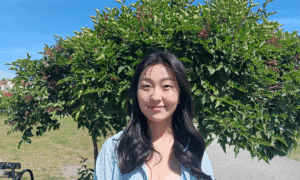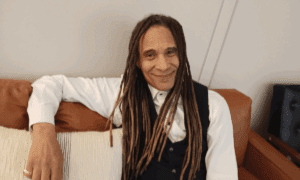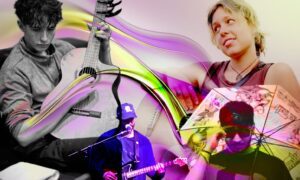In honor of Pride Week, I wanted to share perspectives from older members of the LGBTQ+ community—people who have lived through decades of activism, hardship, and change. With political hostility on the rise, I was looking for insight from those who’ve witnessed the long arc of the LGBTQ+ rights movement. With factors such as the AIDS epidemic in the 1980s and 90s, as well as discriminatory violence, I knew that being a member of the LGBTQ+ community and reaching old age could be difficult, and likely came with a wealth of stories and life experience. My grandfather died of AIDS in 1991, and I wondered what he would say about the world today.
In late May, I visited the GenPride senior home to interview residents. I spoke with two tenants, Ivan and Linda, about today’s political climate surrounding the LGBTQ+ community. Specifically, we discussed speaking up for your beliefs even when it’s not easy, the importance of celebration amidst struggle, and the need to exercise both patience and urgency in addressing the issues facing the LGBTQ+ community and the country as a whole. Their perspectives were important to hear and served as a good reminder of the value of life experience. I was reminded that hearing stories told firsthand provides us with new glimpses at the truth, even in our current world where information is so easily accessible.
Q&A with Ivan and Linda:
What do you wish you knew in your early 20s?
Ivan: How to listen better to people with experience. I was hardheaded and didn’t realize that. They’ve gone through it; they’re giving you advice, and you think you know it all.
What is the biggest change that you’ve seen in the gay community in your lifetime?
Ivan: The biggest change is that it went from acceptance to what’s happening right now. Which is no acceptance. Recently, right now, with the new political situation that is happening, rights are going away.
Linda: Back when I was going to the local library in the ‘60s, you couldn’t find anything in the card catalog about [the LGBTQ+ community]. Just forget it.
How does what’s happening now compare to 30 or 40 years ago?
Ivan: Human rights, gay or straight rights, there is resistance. Many things occur that don’t represent the whole. To me, the biggest change is right now. It went from being able to have equal rights to now supposedly you’re going to have equal rights when you’re not. It will be alright to discriminate.
Is there anything that gives you hope in the world today?
Ivan: There are a lot of smart people, people who see things. Nowadays, the information is out there to realize what is happening. It gives me hope, people are becoming educated, and people are talking. People are realizing what leaders are doing, which does not show the real values of the whole country.
Where do you see those people?
Ivan: Everywhere. There are more good people than bad. We all have barriers; it’s just bringing them out, saying something about it. A lot of times, keeping quiet is not healthy, not what needs to be done. That’s not what they want to hear. It’s like a bully; when you confront a bully, they walk away.
With the Pride Parade coming up, what do you want to stress to the younger generations?
Linda: For starters, the budget is way down because there is no federal money. I would say patience. The current leadership is not going to last. It’s a setback, but I don’t think that’s going to win. I think we’ll go back to the way we’ve been, incrementally getting better.
Ivan: I’m hoping too, but it’s going to take a long time.
Patience seems like a big part of this. From the AIDS epidemic in the 1990s to the Obergefell v. Hodges decision in 2015…
Linda: What really ticked me off was Reagan, when he was president in the 80s. Men were starting to get AIDS, and they wouldn’t put any money towards it. They just let all those people die.
What wisdom do you think those who died of AIDS would give to generations today?
Linda: I don’t know what they could have done. They could have fought back…
Ivan: I’m a scientist, so to me, research is the most important thing. Back then, there was no funding. Every single time something about AIDS came up, nobody knew. People didn’t understand that it wasn’t only a gay thing. Arthur Ashe died because of a blood transfusion. It was known as the “gay disease,” but it was everybody’s disease.
Linda: People thought God was punishing them for being gay
Ivan: Right now, probably 10 years ago, the biggest population that is getting HIV is seniors. And very young people. Because the idea of protecting yourself isn’t there anymore. The whole education has dropped. It doesn’t matter, you can be young, you can be old. In the older group, because you don’t worry about getting pregnant, there is no protection.
What role do you think celebration plays in struggle? Like having Pride during a hard time in the community?
Ivan: It’s a good thing. It brings you out. It makes you proud. People have been hiding for so long and have felt put down. It’s saying, “Hey, I’m here, I’m alive, I have rights, I want to celebrate who I am, I am unique.” Whatever the reason, it doesn’t matter who you are; you are unique.
Sometimes when it is the hardest to celebrate, we’ve got to band together.
Ivan: That’s the other thing. Life is hard. Band together, enjoy yourselves. These are people who have gone through it. They come from different areas, and they all go through different problems
What would you recommend to the allies who go to the parade?
Ivan: It’s support. You have to support the community. Because the community is not just one group. It’s everybody.
Linda: Be prepared for nudity.
Ivan: It doesn’t matter whether you’re straight; we all are in the same place. This building is a good example; we’ve got everybody in here. At the end of the day, we’re all the same. The minority sometimes wants to tell you what to do, but I’m not willing to do that. It’s a small group claiming that they’re talking for everybody. They’re not.
What do you think is special about GenPride?
Ivan: It’s the unity, it’s the people, it’s the exchange. Not everybody agrees with everybody, and there are problems like in any community. But we sit here and all try to get along.
Linda: Not everybody is gay, but it is an LGBTQ+ affirming place, which is amazing.
Ivan: They’re advocates.
Jackson: I’ll be honest, I didn’t know that centers like this existed.
Linda: It’s pretty unique, is there another one in the country I’m not sure.
Ivan: It’s given an opportunity to a lot of people, because of whatever choices in life, you end up needing a place like this. And you’re still independent, which is nice.
Linda: Compared to the last apartment community I lived in, there is much more camaraderie here. There are many more opportunities to sit around and talk. It’s more supportive. It’s not perfect, we still have jerks in here. But by and large, it feels better. Not lonely.
Ivan: There’s going to be jerks everywhere.
Is there anything else you want the readers to know?
Ivan: Society is everybody; the minority cannot control it. Another thing, you cannot be quiet. When you see something wrong, you talk about it. I’m using Saturday’s protest as an example; it happened down at the park. They have the right to do that, just like I have the right to my own beliefs.
What was the protest?
Linda: It was a church group, especially coming down on transgender people.
Ivan: It was a big thing. Police got involved, and the riot police got involved. Sometimes the right thing is the hardest thing to do. Sometimes you have to put yourself on the line. That’s the problem; it’s hard to do that. The other day, I saw someone getting beaten up, so I got involved. I didn’t have to. But I got involved because it wasn’t right.
Editor’s note: The views expressed by interviewees are their own and do not necessarily reflect the views of The Seattle Collegian.
Author
Jackson Ratcliffe is a student at North Seattle College. He likes to meet new people and wants to use his time at the Collegian to shine a spotlight on fresh perspectives from the Seattle Colleges, Capitol Hill, and the Greater Seattle Area. He is a Seattle native who loves the city, and works to tell some of the many stories that it has to offer.







Be First to Comment